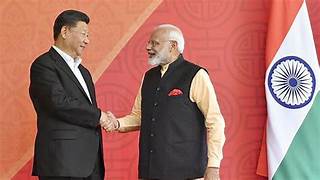Recent reports are extensively covering India’s reaction to China’s recent actions in Arunachal Pradesh, pointing towards an alarming diplomatic escalation of tensions in the region.
In a retaliatory move, India has laid out plans to rename 30 locations in Tibet, a direct response to China’s territorial provocations, echoing the same tactics that China employed in Arunachal Pradesh. In 2017, Beijing began its renaming endeavor, unveiling an initial list of six names. Following this, a second list of 15 names surfaced in 2021, succeeded by a third list in 2023. Recently, in April of this year, China released a fourth roster of such names, revised places within the state included 11 residential areas, 12 mountains, four rivers, and one lake. This ongoing nomenclature information campaign underscores China’s assertive approach to reshaping geographical jargon to assert its territorial claims. Such actions have sparked concerns regarding China’s expansionist ambitions and its implications for regional stability.
Prime Minister Narendra Modi’s decision to undertake such a measure signifies a significant strategic shift in India’s approach towards China and the ongoing territorial dispute.
This decision by India serves as a clear indication of its unwavering commitment to safeguarding its borders and asserting its sovereignty against any external threat. China’s audacious move to rename places in Arunachal Pradesh has understandably raised serious concerns regarding its expansionist ambitions and encroachment onto Indian territory.
India’s renaming of Tibetan locations is perceived as a proactive step to counter China’s aggressive maneuvers and uphold its territorial integrity. Modi’s administration is intent on sending a resolute message to China, adopting a tit-for-tat strategy in response to the border dispute.
India acknowledges the imperative nature of countering China’s territorial assertions and thwarting any further encroachment onto its land. The role played by the Indian Army’s information warfare division is paramount in shaping public opinion and countering Chinese propaganda.
Through various mediums such as social media and research institutes, efforts are made to debunk Chinese narratives while providing historical evidence to substantiate India’s sovereignty claims. Media trips organized by the Indian Army aim to showcase local sentiments opposing Chinese claims in disputed border regions, thereby lending credibility to India’s stance and reinforcing its sovereignty claims.
Extensive historical research forms the bedrock of India’s counter-narrative, shedding light on its enduring presence in disputed territories. India’s information warfare strategy operates discreetly, aiming to counter Chinese influence and sway public opinion in its favor.
Modi’s proactive approach underscores India’s resolve to safeguard its borders and assert its sovereignty against external threats, particularly from China. China’s actions in disputed regions exemplify its aggressive territorial expansion and disregard for international norms. Modi’s decision to rename Tibetan locations symbolizes India’s determination to project strength and challenge China’s dominance in the region.
Psychological factors, such as perceptions of power and national identity, significantly influence Indo-China relations and territorial disputes. India’s counter-narrative strategy emphasizes historical truths and local perspectives to bolster its territorial claims, challenging Chinese propaganda. India’s response underscores its steadfast commitment to defending its borders and sovereignty against external aggression.
Modi’s administration aims to leverage media and information warfare to counter China’s influence and assert India’s territorial integrity. The renaming of Tibetan locations serves as a symbolic gesture of India’s defiance against Chinese aggression and territorial claims.
India’s proactive stance reflects its resolve to confront China and safeguard its national interests amidst escalating tensions. Modi’s leadership style emphasizes strength and assertiveness in dealing with external threats, particularly from China. The ongoing border dispute highlights the intricate geopolitical dynamics and strategic interests at play in the Indo-China relationship.
India’s response to China’s actions in Tibet underscores its readiness to defend its borders and sovereignty, and close bilateral ties with Tibet, signaling a notable shift from its historical position on Tibet, where at a diplomatic level, India recognized the area as an autonomous region within China while providing refuge to Tibetan spiritual leader Dalai Lama and supporting Tibetan exiles.








